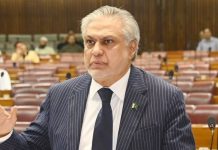ISLAMABAD: In a reply submitted to the Supreme Court, former president retired Gen Pervez Musharraf has claimed that he promulgated the National Reconciliation Ordinance (NRO) 2007 without having any mala fide or vested interestsand to end acrimony between different political parties and (improve) political conditions prevailing then.
Mr Musharraf pleaded that the NRO 2007 was promulgated by him as then president on the advice of the government, which was later declared by the apex court void ab initio through its judgement in December 2009.
The reply was submitted by his counsel Akhtar Shah in response to earlier directives of an SC bench seized with a petition of Feroz Shah Gilani, president of the Lawyers Foundation for Justice, in which he has named Mr Musharraf, former attorney general Malik Muhammad Qayyum, former president Asif Ali Zardari and the National Accountability Bureau as respondents.
 Mr Musharraf said the promulgation of the NRO was aimed at fostering mutual trust and confidence amongst the holders of public office, removing vestiges of political vendetta and victimisation, making the election process more transparent and amending certain laws, in addition to ancillary-related matters.
Mr Musharraf said the promulgation of the NRO was aimed at fostering mutual trust and confidence amongst the holders of public office, removing vestiges of political vendetta and victimisation, making the election process more transparent and amending certain laws, in addition to ancillary-related matters.
The reply insisted that all actions taken by the then president were in accordance with the laws as existed at that time.
Mr Musharraf requested the court to dismiss the petition to the extent of his involvement.
Earlier, Mr Zardari had filed a reply pleading that no case of causing losses to the public exchequer or looting and plundering national wealth had ever been proved against him in Pakistan or abroad.
He said he had no role in the promulgation of the NRO because he was in jail when it was introduced, adding that the cases against him were reopened when the NRO was set aside by the Supreme Court in 2010 and all cases were tried de novo which resulted in his acquittal on merit.
At the last hearing on July 4, the Supreme Court had asked for details of assets of Gen Musharraf, Mr Zardari and Malik Qayyum.
The court had ordered the respondents to furnish details of their bank accounts and assets both inside and outside the country as well as investments made in offshore companies.
They were also asked to disclose details of assets of their spouses and children both in the country and abroad.



